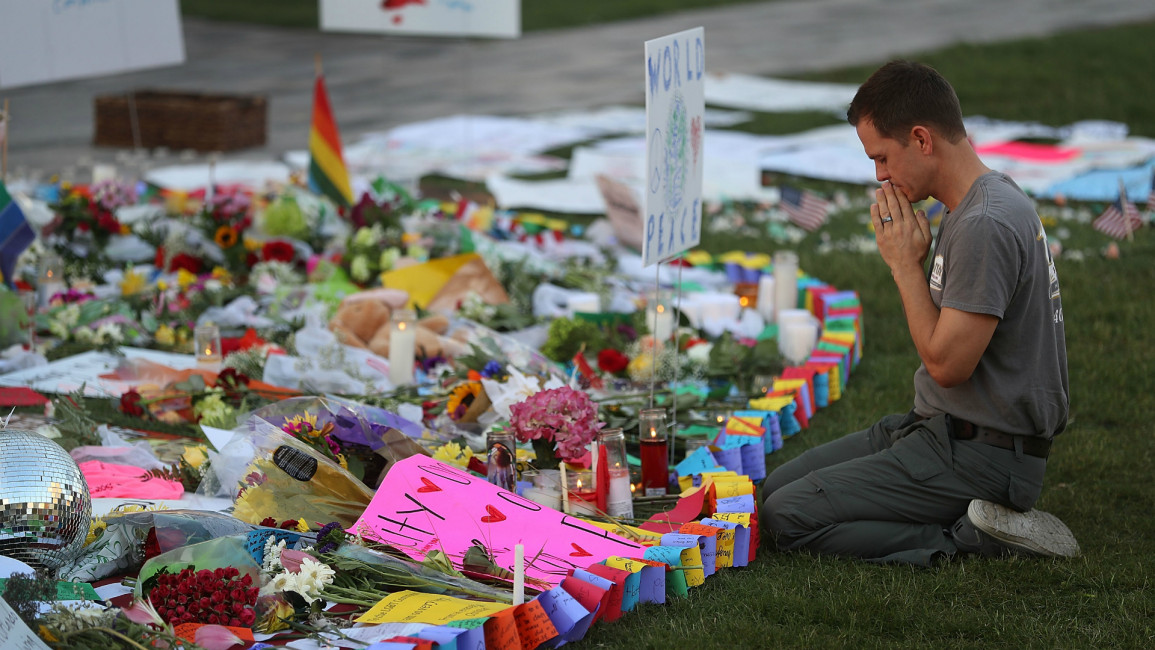Orlando gunman demanded US end airstrikes in Syria, Iraq
A transcript of the phone conversation was released on Friday which reveals Mateen identified himself to a 911 operator as the shooter at the Pulse nightclub in Orlando approximately half an hour after the attack began, and pledged allegiance to IS.
49 people were killed in the June 12 attack and a further 53 were seriously injured.
"I want to let you know I'm in Orlando and I did the shooting," Mateen said.
Soon afterwards, when a police negotiator returned the call, Mateen demanded that Washington stop its airstrikes in Syria and Iraq.
"They are killing a lot of innocent people," said Mateen, the New York-born son of an Afghan immigrant. "What am I to do here when my people are getting killed over there?"
Later during the conversation Mateen pinpointed the death of IS military leader Abu Wahid, killed in a May airstrike, as a trigger for his actions.
"They should have not bombed and killed Abu Wahid," said Mateen who also compared himself to Boston Marathon bomber Tamerlan Tsarnev according to the transcripts.
Three people were killed and more than 260 injured after two bombs, planted by Tsarnev, exploded at the finishing line of the Boston Marathon in 2013.
"My homeboy Tamerlan Tsarnaev did his thing on the Boston Marathon," Mateen said. "So, now it's my turn, OK?"
Mateen further told negotiators that he had fasted and prayed all day before heading to the Florida nightclub since it was Ramadan, and that he had planted bombs in a vehicle outside the gay nightclub, a claim that later turned out not to be true.
During the phone interactions Mateen, a security guard who once sought to become a police officer, hung up on several occasions, also asking the negotiation at one point what year he had graduated from the police academy.
 |
"My homeboy Tamerlan Tsarnaev did his thing on the Boston Marathon. So, now it's my turn, OK?" Omar Mateen, perpetrator of Pulse nightclub massacre |
 |
Shortly before hanging up Mateen said “Look, you're annoying me with a lot of your phone calls".
The city of Orlando has made public dozens of 911 calls this week as well as transcripts from three conversations Mateen had with police negotiators following pressure from media groups seeking their release.
The release of the records, media groups have argued, would help the public evaluate the police response to the massacre. But the city had said the records were exempt from the state’s public records law, both due to the fact they were part of an ongoing investigation, and because some were graphic calls from those trapped in the Pulse nightclub being shot and killed.
The FBI, which is investigating the mass shooting, said earlier this month that withholding the records was no longer necessary.
On Friday Darryl Bloodworth, an attorney representing the city, disclosed that almost two-thirds of the more than 600 emergency calls had been made public with the remaining 229 calls exempt from public disclosure under a Florida law that bans the release of records or someone being killed.
Bloodworth said that the city of Orlando had classified as exempted all calls made from or going into the Pulse nightclub on June 12.
Rachel Fugate, an attorney for the media groups, has described the city's classification as too broad with a hearing on the issue set to be scheduled for a later date.
Bloodworth said that family members and survivors may be able to express how they feel about the calls being released, Bloodworth said in comments published in the Associated Press.
Since events in Orlando on June 12 a number of further Islamic-state inspired attack plots have been uncovered by US security forces raising security concerns in the United States.
On September 19 Ahmad Khan Rahani, a US national of Afghani heritage, was arrested following a shoot out with police in New York having planted three bombs in the city the previous weekend. One of the bombs detonated injuring 29 people.
(Agencies contributed to this report)



